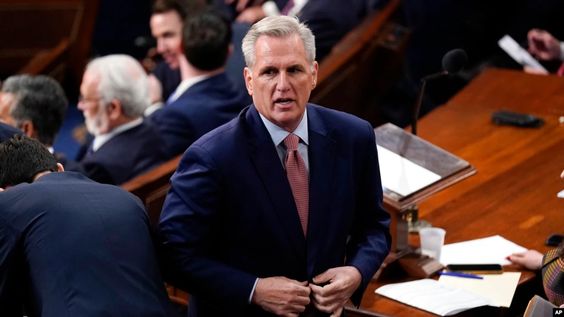Headlines
US House members reject Kevin McCarthy as speaker on three ballots

As a group of staunchly conservative US representatives continued to vote against fellow Republican Kevin McCarthy’s effort to preside over the 118th Congress, the U.S. House of Representatives was unable to elect the next Speaker of the House on Tuesday. The House adjourned until Wednesday at noon to resume the procedure after three rounds of voting.
For the first time in 100 years, neither a Republican nor a Democrat won the speakership of the 435-member House in the first round of voting.
With 20 Republicans voting against him in the third round of voting, McCarthy was unable to secure the speakership. There will be a fourth voting round, but it’s uncertain if enough of McCarthy’s rivals will stop opposing him or if new contenders will show up.
With one vacancy and a slim Republican majority of 222-212 in the House, McCarthy, a 16-year veteran of the California legislature, will need to garner at least 218 votes to become the new speaker. He would also move up in the line of succession for the presidency of the United States in accordance with a clause in the U.S. Constitution.
In the first round of voting, however, 19 Republicans voted for other Republican lawmakers, including Representatives Andy Biggs of Arizona and Jim Jordan of Ohio, who are both vocal critics of Democratic President Joe Biden.
Even though Jordan nominated McCarthy to head the majority Republican caucus in the upcoming two-year House term, 20 dissident Republicans supported him in the third round of voting.
The voting for the speakership was led by Democratic Representative Hakeem Jeffries of New York, who received the support of all 212 Democrats despite the fact that he has no chance of winning because no Republicans intend to support him. McCarthy received 202 Republican votes on the most recent ballot, falling 16 short of the 218 he required.
McCarthy, 57, a fervent conservative himself, has desired to be the Speaker of the House for many years. In the past few weeks, he has met with his Republican rivals several times to try to get their support for his bid to become speaker.
If members of the House did not agree with McCarthy’s policy positions or the way the party caucus was carrying out its promised investigations into Biden and his administration, McCarthy offered to change the House’s governing rules in a number of ways, including by allowing snap votes to declare the speakership vacant and elect someone else.
But as the long roll call voting went on, it was clear that McCarthy didn’t have enough support to get a majority.
McCarthy or whoever the Republicans ultimately choose will succeed departing Democratic House Speaker Nancy Pelosi, who is still a member of the House and voted for Jeffries.
Even after former Democratic Senator Kyrsten Sinema declared she is now an independent but won’t change her voting philosophy, Democrats, who have been locked in a 50-50 split with Republicans in the Senate for the past two years, gained ground in the nationwide congressional elections nearly two months ago and will hold a 50-49 majority in the upper chamber. She frequently casts her vote alongside Biden and Democratic lawmakers.
McCarthy got 188 votes in a House Republican caucus in November, and the 203 votes he got in two ballots on Tuesday show that he has gained more support since then as he tries to get the 218 votes he needs to become speaker.
The hard-right faction of House Republicans, however, opposes McCarthy’s bid for speaker because they believe he has not given enough support to the conservative cause and represents what they see as failed Republican leadership with Biden in the White House promoting progressive social policies and federal spending plans that the majority of Republicans oppose.
Even before lawmakers are sworn in for their two-year tenure, the House speaker is chosen. During the fourth round of voting, and potentially beyond, lawmakers called out the name of their choice for House speaker from the floor of the house.
